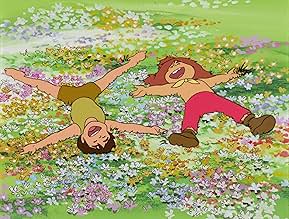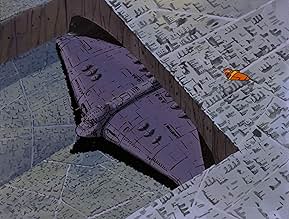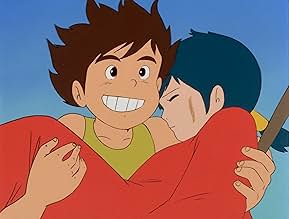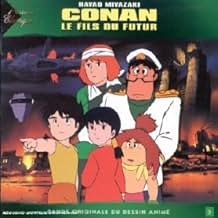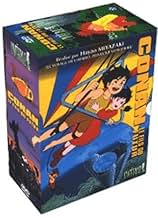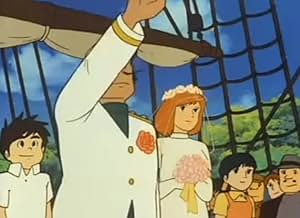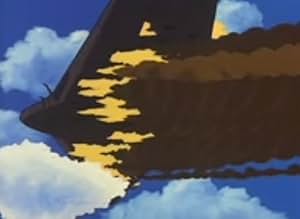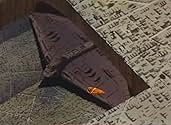Nachdem die Welt durch einen Krieg fast zerstört ist, müssen ein kleiner Junge und seine Freunde kämpfen, um die Welt vor denen zu retten, die versuchen, das zu erobern, was von der Zivilisa... Alles lesenNachdem die Welt durch einen Krieg fast zerstört ist, müssen ein kleiner Junge und seine Freunde kämpfen, um die Welt vor denen zu retten, die versuchen, das zu erobern, was von der Zivilisation übrig geblieben ist.Nachdem die Welt durch einen Krieg fast zerstört ist, müssen ein kleiner Junge und seine Freunde kämpfen, um die Welt vor denen zu retten, die versuchen, das zu erobern, was von der Zivilisation übrig geblieben ist.
Folgen durchsuchen
Empfohlene Bewertungen
Conan is a cult case in Portugal, at least for people who are now around their thirties. Having been broadcast in 1984, it garnered a lot of following and deservedly so (it has been put on sale on DVD the past year - 2004). The story, has most of the themes that populates Miyazaki's work: man as the entity that destroys nature, the conflict between nature and technology, elements that would be developed in features like "Castle in the Sky" or "Princess Mononoke". I've been a fan of Mr. Miyazaki's work for some time now, and that started with Conan (and I personally remember having the cards that were placed on sale at the time it was first shown) - this show was magical, funny and the main character represented a freedom that every kid longs or aims for. The animation nowadays is dominated by computers, but somehow this work is a true classic: you still look at it with awe and amazement, for all the uniqueness that made it so special when it first was shown is still all there. A must see!
Highly dramatic and engaging, this TV series was near perfect and shows Miyazaki's talents for the first time he directed something. Interestingly, Miyazaki's characters that he developed in this TV series served as prototypes for the films he made. Indeed, this TV series is actually one 26 episode long film with many subplots that constitute each of the episodes.
Also, it is impressively dramatic considering it was a TV series marketed for children. The Japanese animated TV series were always much more dramatic and complex than American animated TV series, but in the 1970's anime it was still in its early stages and wasn't as well developed as it became in the 1980's, when it's range expanded to all demographic groups.
An excellent TV series, indeed, one of the most powerful ever made. Yes, I said powerful for an animated TV series from the 1970's, because it is.
Also, it is impressively dramatic considering it was a TV series marketed for children. The Japanese animated TV series were always much more dramatic and complex than American animated TV series, but in the 1970's anime it was still in its early stages and wasn't as well developed as it became in the 1980's, when it's range expanded to all demographic groups.
An excellent TV series, indeed, one of the most powerful ever made. Yes, I said powerful for an animated TV series from the 1970's, because it is.
10xoraxora
I would say its the best "animated anything" of all time, but to avoid excessive hyperbole I reluctantly confine myself to "Japanese anime TV series". This is one of Hayao Miyazaki's earlier projects (by no means earliest), and yet it is his best. The colors are not as rich, the animation not as fluid as in his later works but its still his best. Its a 1970's anime made with 1970s techniques, yet you could not want it any other way. The character's drawing is simple by later standards, monotone faces, quite flat, but they are unforgettable and their visual "flatness" only emphasizes their depth of character. The scenery despite the limitations of technology is simply beautiful. All in all, what Miyazaki achieved with this series is the equivalent of replicating the Mona Lisa using nothing but crayons. I will say no more. Except that I pity that part of the world which never had the pleasure to watch it or even hear of it.
Though Hayao Miyazaki's work at Studio Ghibli is known the world over, few outside of Japan seem to know or care about the work he did before that in the 70s and early 80s. It's a real shame, because works such as Future Boy Conan (1978) still hold up well today despite the choppy television animation.
The plot is chock full of iconic Miyazaki themes and archetypes which look forward to his later films and manga. The post-apocalyptic setting, motif of flight, morally ambiguous characters, and environmentalist theme should all be familiar to hardcore Miyazaki fans. In fact, the whole thing feels like a dress rehearsal for the later Castle in the Sky (1986): the relationship between Lana and Conan mirrors the later bond between Pazu and Sheeta, the villain Lepka resembles Muska, and Captain Dyce and his crew bring to mind the Dola pirates.
Despite the similarities, though, Future Boy Conan stands well on its own. I would even go as far as to say it equals (or in some cases, even betters) Castle in the Sky. Being a 26-episode TV series, it has more time to let its characters develop and grow. One major difference between FBC and later Miyazaki is it's broad comedy. There's lots of goofy slapstick and silly moments that you don't see the like of in post-Nausicaa Miyazaki. Still, it's good comedy that never feels out of place.
I know most anime fans won't watch anything preceding Dragonball, but Ghibli fans and Miyazaki diehards will enjoy this series without a doubt. It helps show you where all those ideas, characters, and themes of his later films were first allowed to be fully expressed.
The plot is chock full of iconic Miyazaki themes and archetypes which look forward to his later films and manga. The post-apocalyptic setting, motif of flight, morally ambiguous characters, and environmentalist theme should all be familiar to hardcore Miyazaki fans. In fact, the whole thing feels like a dress rehearsal for the later Castle in the Sky (1986): the relationship between Lana and Conan mirrors the later bond between Pazu and Sheeta, the villain Lepka resembles Muska, and Captain Dyce and his crew bring to mind the Dola pirates.
Despite the similarities, though, Future Boy Conan stands well on its own. I would even go as far as to say it equals (or in some cases, even betters) Castle in the Sky. Being a 26-episode TV series, it has more time to let its characters develop and grow. One major difference between FBC and later Miyazaki is it's broad comedy. There's lots of goofy slapstick and silly moments that you don't see the like of in post-Nausicaa Miyazaki. Still, it's good comedy that never feels out of place.
I know most anime fans won't watch anything preceding Dragonball, but Ghibli fans and Miyazaki diehards will enjoy this series without a doubt. It helps show you where all those ideas, characters, and themes of his later films were first allowed to be fully expressed.
This is one of the first Miyazaki's. He made it in 1978. Was originally released in Italian then dubbed to Japanese. Future boy Conan is a story about a boy and his grand father who were the only survivors of the third world war. Apparently, there were more survivors who did not learn the lesson of preserving life. The anime is not about super beings or the supernatural. It is about ordinary people with ordinary powers driven by pure feelings of goodwill and platonic love. Miyazaki engraved his name in history and in the heart of generations to come with this anime. He gave life to those characters who live in our heart as people we know and learn from. The story line is superb. The characters are lovely. The drawing is magnificent for a 1978 anime. What else are you waiting for....don't miss this anime.
Wusstest du schon
- WissenswertesLoosely based on "The Incredible Tide" by Alexander Key. The basic premise is same, but the story in the anime is mostly Hayao Miyazaki's original. In the book, Conan is 14, while in the anime he is 11. Conan doesn't have superhuman strength in the book, as he does in the anime. Miyazaki said he didn't like the book very much. When the project was brought to him, he made sure that he could change the story however he wanted.
- VerbindungenEdited into Mirai shônen Konan (1979)
Top-Auswahl
Melde dich zum Bewerten an und greife auf die Watchlist für personalisierte Empfehlungen zu.
- How many seasons does Future Boy Conan have?Powered by Alexa
Details
Zu dieser Seite beitragen
Bearbeitung vorschlagen oder fehlenden Inhalt hinzufügen


